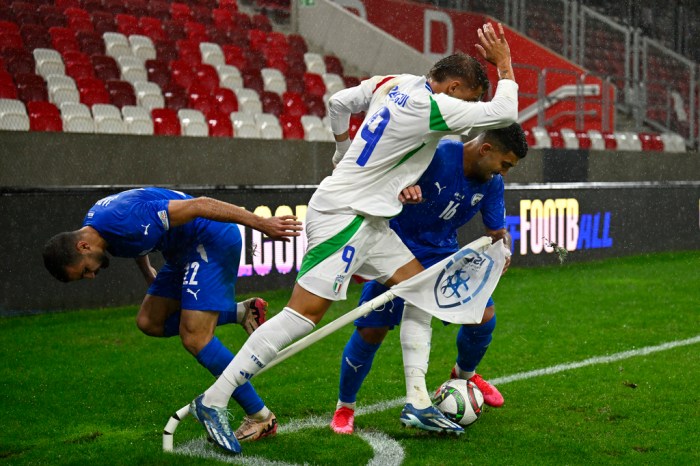UEFA Nations League games have become a significant force in international football, reshaping the landscape of the sport. This competition, established in 2018, offers a unique platform for national teams to compete regularly, fostering intense rivalry and providing valuable opportunities for development.
The Nations League, with its distinct format and competitive spirit, has not only redefined international football but also fueled the growth of the game on a global scale.
The competition’s structure, featuring four leagues based on team rankings, ensures that nations of varying strengths engage in meaningful matches. The Nations League has become a vital tool for national teams to test their mettle, experiment with tactics, and prepare for major tournaments like the European Championship and the World Cup.
Moreover, the Nations League has sparked new rivalries and added a layer of excitement to international football, making it a compelling spectacle for fans worldwide.
Overview of UEFA Nations League
The UEFA Nations League is a biennial international football competition for men’s national teams organized by the Union of European Football Associations (UEFA). Established in 2018, the competition aims to provide a more meaningful and competitive environment for national teams in Europe, replacing the traditional friendly matches with competitive fixtures.The UEFA Nations League has become a significant part of the international football calendar, offering teams the opportunity to compete against nations of similar strength and earn valuable ranking points.
Format of the UEFA Nations League, Uefa nations league games
The UEFA Nations League is divided into four leagues (A, B, C, and D), with teams ranked based on their UEFA coefficient. Each league consists of four groups of three or four teams. Teams play home and away matches within their groups during the league phase.The top two teams in each group of Leagues A, B, and C advance to the knockout phase, while the bottom-ranked team in each group of Leagues A and B is relegated to the league below.
The top team in each group of League D is promoted to League C.The knockout phase consists of semi-finals, a third-place playoff, and the final, played between the winners of the semi-finals. The winner of the final is crowned the UEFA Nations League champion.
Significance of the UEFA Nations League
The UEFA Nations League has several significant impacts on international football:
- Increased Competitive Intensity:The Nations League provides a more competitive environment for national teams compared to friendly matches, allowing them to test their abilities against teams of similar strength. This fosters a more meaningful and engaging competition.
- Improved Team Development:The Nations League offers teams valuable opportunities for development and preparation for major tournaments like the European Championship and the World Cup. Teams can experiment with tactics and player combinations in a competitive setting, improving their overall performance.
- Enhanced Ranking System:The Nations League results directly impact the UEFA coefficient rankings, which determine seeding for qualifying tournaments. Teams that perform well in the Nations League gain an advantage in qualifying for major tournaments.
- Financial Incentives:The UEFA Nations League offers financial incentives to participating teams, with prize money awarded to teams based on their performance. This provides financial support for national football associations and helps to develop the sport at the grassroots level.
“The UEFA Nations League is a competition that is designed to bring more meaning and relevance to international football. It is a competition that is played between nations of similar strength, which makes it more competitive and exciting for fans.”
UEFA President Aleksander Čeferin
Key Features of UEFA Nations League Games
The UEFA Nations League, established in 2018, has brought a fresh dynamic to international football. This competition, featuring national teams from across Europe, offers a unique platform for teams to compete in a structured format, fostering development and providing valuable preparation for major tournaments.
Unique Format and Structure
The Nations League’s structure sets it apart from traditional international friendlies. Teams are divided into four leagues based on their UEFA rankings, with promotion and relegation between leagues. This format ensures competitive balance and offers opportunities for weaker teams to climb the rankings.
The league format also provides a more meaningful context for each match, as teams compete for promotion, relegation, or a place in the final tournament.
- League System:The Nations League employs a league system, with four tiers (A, B, C, and D) based on UEFA rankings. This format fosters competitive balance and provides opportunities for weaker teams to climb the rankings.
- Promotion and Relegation:Teams can be promoted or relegated between leagues based on their performance. This dynamic adds another layer of competition and incentivizes teams to perform well.
- Final Tournament:The top four teams in League A qualify for a final tournament, culminating in a championship match. This provides a platform for the strongest teams in Europe to compete for a prestigious title.
Tactical Approaches and Strategies
The Nations League has influenced tactical approaches in international football. The competitive nature of the competition, with teams vying for promotion, relegation, or a place in the final tournament, has encouraged managers to experiment with different formations and strategies.
- Emphasis on Tactical Flexibility:The Nations League’s competitive nature encourages managers to experiment with different formations and strategies, leading to a greater emphasis on tactical flexibility.
- Focus on Development:The Nations League provides a platform for managers to experiment with young players and test out new tactical approaches, fostering development within national teams.
- Importance of Match Analysis:With the increased importance of each match, teams place greater emphasis on match analysis, scouting opponents, and developing targeted game plans.
Intensity and Importance
While the Nations League may not carry the same weight as major tournaments like the World Cup or European Championship, it is considered a significant competition, especially for teams seeking to improve their ranking and prepare for major events.
- Preparation for Major Tournaments:The Nations League serves as a valuable preparation ground for major tournaments, allowing teams to test their tactics, build team cohesion, and gain competitive experience.
- Ranking Points:Matches in the Nations League contribute to the UEFA national team rankings, which determine seeding for major tournaments. This incentivizes teams to perform well and secure favorable seeding.
- Competitive Spirit:Despite the absence of a World Cup or European Championship title, the Nations League fosters a competitive spirit among teams, as they strive for promotion, avoid relegation, or qualify for the final tournament.
Impact of UEFA Nations League Games

The UEFA Nations League, introduced in 2018, has had a significant impact on the landscape of international football, impacting national team performance, talent development, and the overall structure of the game. This innovative competition has provided a platform for teams to engage in meaningful matches beyond traditional friendlies, offering a new dynamic to the international game.
Impact on National Team Performance
The Nations League has provided a platform for national teams to compete against similarly ranked opponents, leading to more competitive and tactical encounters. This regular exposure to high-level competition has contributed to the improvement of national team performance, particularly for smaller nations.
For example, the Netherlands, under Ronald Koeman, rose from the League C to League A in the inaugural edition, demonstrating the potential for growth and improvement. The competition’s format also provides valuable preparation for major tournaments like the European Championship and the World Cup, as teams gain experience playing against diverse opponents.
The UEFA Nations League is a great way to see some of the best national teams in action, but for those seeking a different kind of action, the highly anticipated black myth wukong ps5 physical copy might be the perfect choice.
This game promises a thrilling journey through a fantastical world, offering a break from the real-world drama of the UEFA Nations League. But whether you choose to watch international football or delve into a mythical adventure, the choice is yours to make.
Role in Developing and Promoting Young Talent
The Nations League has offered opportunities for emerging players to gain valuable experience at the international level. With the focus on competitive matches, managers are more likely to experiment with young talent, giving them a platform to showcase their abilities and gain valuable exposure.
The Nations League’s structure allows for teams to rotate their squads, giving opportunities to players who might not have featured in major tournaments. This exposure to high-pressure situations can contribute to their development and confidence, ultimately benefitting both the national team and the player’s career.
Contribution to the Overall Landscape of International Football
The UEFA Nations League has brought about a more structured and meaningful calendar for international football. The traditional friendly matches, often lacking in competitive intensity, have been replaced with competitive fixtures, raising the overall quality and interest in international games.
The Nations League has also provided a more equitable distribution of revenue among national associations, particularly benefiting smaller nations. This financial support allows them to invest in infrastructure, coaching, and youth development programs, further strengthening the overall health of international football.
The competition has also created a sense of urgency and excitement, as teams compete for promotion, relegation, and a chance to qualify for the final tournament. This competitive spirit has injected new life into international football, captivating fans and fostering a more engaging experience.
Notable UEFA Nations League Games

The UEFA Nations League has produced some memorable matches since its inception in 2018. These games have featured thrilling comebacks, dramatic late goals, and captivating tactical battles, leaving a lasting impact on the competition and the teams involved.
Notable Games
These games showcase the intensity and importance of the UEFA Nations League.
| Date | Teams | Score | Significance |
|---|---|---|---|
| September 6, 2018 | Portugal vs. Spain | 1-1 | The first-ever UEFA Nations League match, which set the stage for a competitive and exciting tournament. Cristiano Ronaldo scored a late penalty to earn Portugal a draw against their Iberian rivals. |
| June 9, 2019 | Netherlands vs. England | 3-1 | A crucial match in the group stage, which saw the Netherlands dominate England with a clinical display of attacking football. This victory secured the Dutch team’s top spot in the group. |
| October 14, 2019 | France vs. Portugal | 0-1 | A dramatic match that saw Portugal win thanks to a late goal from João Félix. This victory propelled Portugal to the finals of the inaugural UEFA Nations League tournament. |
| June 6, 2021 | Italy vs. Belgium | 2-1 | A high-stakes semi-final match that saw Italy defeat Belgium with a stunning display of attacking prowess. The match was a testament to the tactical brilliance of Roberto Mancini and the resurgence of Italian football. |
| June 10, 2021 | Italy vs. Spain | 2-1 | The final of the 2021 UEFA Nations League, which saw Italy emerge victorious in a closely contested match. The Italians displayed resilience and tactical discipline, securing their first major international title since the 2006 FIFA World Cup. |
Future of UEFA Nations League Games

The UEFA Nations League, a relatively new competition, has already established itself as a significant force in international football. Its future direction is likely to be shaped by its ongoing success, evolving trends in the sport, and the constant need for innovation.
Potential Changes to the Format or Rules
The current format of the UEFA Nations League, with its four leagues and promotion/relegation system, has been praised for its competitive balance and opportunity for smaller nations to compete. However, potential changes to the format or rules are constantly being considered.
Here are some possible changes:
- Expansion of the Tournament:The Nations League could be expanded to include more teams, potentially allowing for greater participation from nations outside of Europe. This could create a more globalized competition and foster stronger relationships between football federations.
- Increased Number of Matches:The number of matches per season could be increased to provide more opportunities for teams to compete and showcase their skills. This could also lead to a more competitive and engaging tournament.
- Introduction of Play-offs:Play-offs could be introduced to determine the overall winner of the competition, adding another layer of excitement and intrigue to the tournament. This would allow for a more definitive champion and create greater anticipation for the final stages of the competition.